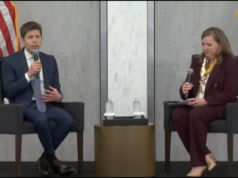The indictment charges that Sushovan Hussain, “together with others, engaged in a fraudulent scheme to deceive purchasers and sellers of Autonomy securities and HP about the true performance of Autonomy’s business, its financial condition, and its prospects for growth.”
The charges highlight a painful chapter for HP, which had hoped the Autonomy purchase would help transform the company as it struggled with faltering computer gear sales. Instead, it became an embarrassing debacle that spawned multiple lawsuits and a massive settlement with disgruntled shareholders.
After buying the British company, HP was immediately criticized by analysts for paying too much. A year later, HP announced it had written down $8.8 billion of value in Autonomy, more than $5 billion of that because of alleged accounting improprieties and misrepresentation of finances by Autonomy. Last year, HP reached a $100 million settlement in a class-action lawsuit by shareholders claiming investors were harmed by HP’s pre-purchase hype of the acquisition.
On Thursday, federal prosecutors indicted Hussain in U.S. District Court in San Francisco. He was charged with wire fraud and conspiracy to commit wire fraud. Wire fraud is financial fraud involving use of telecommunications or information technology.
The charges carry a combined maximum prison sentence of 20 years. The federal government is seeking at least $7.7 million from Hussain, money it said was gained through crime.
Hussain’s lawyer said his client was innocent and would be acquitted at trial.
“He defrauded no one and, as Autonomy’s CFO, acted at all times with the highest standards of honesty, integrity and competence,” John Keker said in a statement. “It is a shame that the Department of Justice is lending its support to HP’s attempts to blame others for its own catastrophic failings. Mr. Hussain is a UK citizen who properly applied UK accounting rules for a UK company. This issue does not belong in a U.S. criminal court.”
A spokesperson for other members of the former Autonomy management team said HP had made “a series of false accusations” against Autonomy in 2012. “HP has lied to the markets and to shareholders, squandering millions of dollars of shareholder money in the process,” said the spokesperson.
But federal prosecutors allege Hussain and others — who were not named — artificially inflated revenues, made false and misleading statements about Autonomy’s finances, put fraudulent entries into the company’s books, issued false and misleading quarterly and annual reports, and intimidated, pressured and paid off people who had raised complaints or criticized the firm’s financial practices and performance.
HP took significant heat over the purchase, especially after reports emerged that analysts had been warning before the deal of perceived irregularities in Autonomy’s finances. In 2009, analyst Paul Morland of Peel Hunt called Autonomy’s financial statements “wrong and misleading.”
Daniel Mahoney, research director of forensic accounting firm CFRA, told this newspaper in 2012 that his company in 2007 started sounding alarms about Autonomy in reports to investor clients.
Summarizing the beliefs of himself and other analysts, Mahoney said, “Our concern was the organic growth that Autonomy was reporting was overstated … it seemed like they were constantly moving things around in their financial statements to make things appear better than they are.”
The indictment may eventually provide some vindication for the HP board members and executives involved in the Autonomy purchase, said analyst Patrick Moorhead of Moor Insights & Strategy.
“It makes them look better,” Moorhead said. “This doesn’t get them their $11 billion investment back. (But) if he’s convicted, it completely vindicates HP.”
Meg Whitman, who had been on HP’s board when the deal was announced in August 2011 and then became CEO, told CNBC in 2012 she regretted voting to buy Autonomy. Whitman is now CEO of Hewlett Packard Enterprise.
Last year, HP filed a $5.1 billion lawsuit in London — scheduled to proceed in 2018 — accusing former Autonomy CEO Mike Lynch and Hussain of accounting fraud. In a letter to HP, a lawyer for Lynch, who filed a $150 million countersuit against HP, claimed that “HP’s patchwork tale of alleged misconduct rests on a faulty foundation of false facts, unsupported inferences, and a misunderstanding and misapplication of the relevant legal and accounting standards.”
Lynch’s lawyer Christopher Morvillo said Autonomy had been transparent with a team from Deloitte, who before the sale had “audited the precise issues HP appears to contest, and who, to this day, stand by the accounts.”
© 2016 San Jose Mercury News
syndicated under contract with NewsEdge. -.






